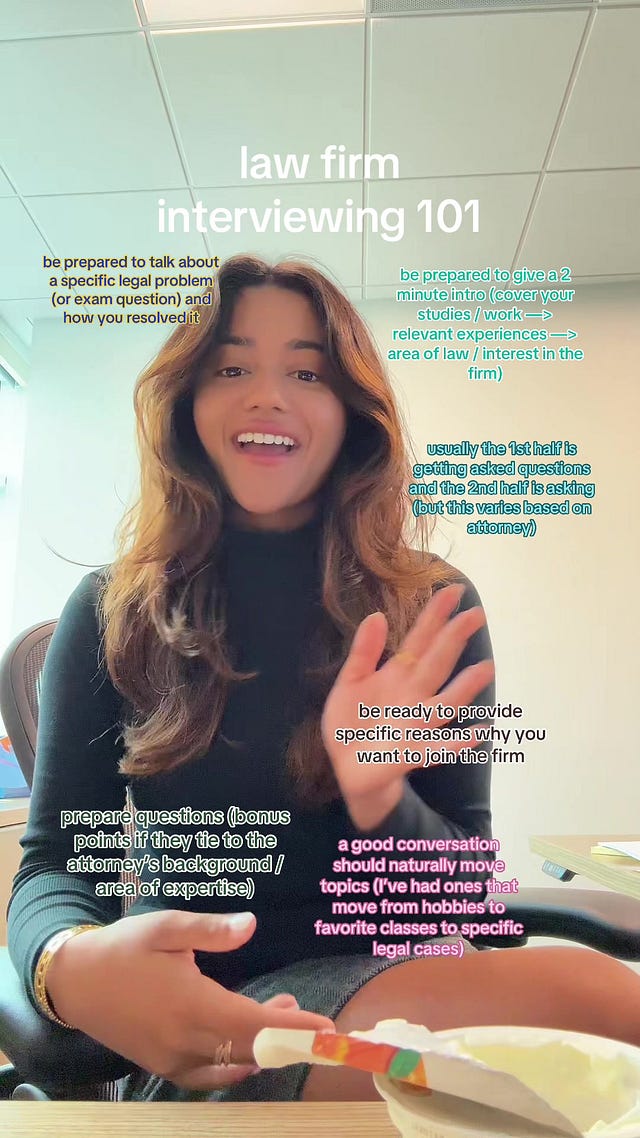I’m almost done with my first month and within a few weeks, I’ll have taken my first final of the semester (Copyright is a quarter class).
A large part of 2L has been talking about all things big law. Somehow, it amplified after I got the job: I’m giving advice (thinking, what do I know?) to incoming 1Ls on the recruiting process. I’m also in a positive psychology class and a big sore spot amongst my peers is the general feeling that big law life might not be satisfying, yet its a necessary evil to get to where we ultimately want to go. It’s funny how as 1Ls, we wanted the position so badly. By the time we’ve got it, we’re looking for the next big thing.
But, and I say this sincerely, I’m beyond excited about my firm. I had spent hours struggling through the decision-making process and here on the other side, I’m confident about my choice.
I want to stress an important point: Take this process seriously because, unlike what you read online, firms are NOT all the same and specialty groups within firms are NOT the same. The better you know yourself and your values — the better this process will be for you.
Knowing my Values
Things I care about and how I define them:
Having Fun. Yes, this is seriously number 1. I want to wake up excited most days for work, every day should feel a little different, and I should look forward to talking to people at work.
Fairness. Do people get recognized for their contributions? Are people kind and respectful? Are people getting to do work they want to do, including pro bono? The firm I’m going to doesn’t have a pro bono cap — huge plus.
Community. Do these people like each other? Do they spend time with each other when it’s not required? Have I talked to people that I seem to connect with already and could see being my mentors?
How my values manifest in my interviews:
Talking about a summer research project: “I had a lot of fun working on it. It felt like every time I found a new case on point, it led me down a rabbit hole.”
“It seems like the partner you work under truly recognizes your accomplishments and gives you credit for them. That’s incredible.”
“Mentorship is really important to me, both giving and receiving. Especially being the first in my family to go to law, I often feel like it’s conversations with attorneys that have shaped me professionally, maybe even as much as the actual work. I’ve already talked to X who seems like she would be a great mentor for me if I joined the firm. Our conversations led me to believe I would feel right at home at Y.”
Why it should matter to you:
An attorney who rolls their eyes at my prior bullet is not someone I want to work with.
If you get an offer, they’ll probably match you with mentors who have the same “vibe” as you (aka values).
By provoking authentic conversation with the interviewee, you may hear (hopefully) something genuine about their experience at the firm that aligns.
All interviewers are impressed when people know themselves, their values, and what they are looking for. They will then pitch to you why X place fits.
Getting the Offer
Caveat: Recruiting looks different for everyone. Even my friends and I (attending the same school, in the same section, similar grades) had widely different recruiting experiences.
You can’t predict your timeline
2L firm recruiting does not follow a confined timeline, unlike 1L firm positions.
At Penn, we had a pre-OCI recruiting process (called PEP). Applications opened in June. If we applied to the PEP firms before PEP, we would be barred from participating in PEP. 1Ls from other schools were already doing callbacks by the time employers even had access to our resumes. In August, career services hosted the traditional OCI recruiting. A lot of us got our offers in the middle, but many of us are still looking.
Applications
Taken from my post on 1L recruiting:
The basic components:
An application form. Some applications accurately auto-populate the form with your resume. Others are a hot mess.
Resume. There are specific conventions for law firm resumes. Work with your career center.
Cover Letter. Personalize for higher priority firms. Do not submit a cover letter with another firm’s name.
Transcript. Unofficial PDF works.
Some positions may also require:
Writing Sample. You can tweak a Legal Writing product. Make sure to add a cover page explaining what the document was prepared for. Talk about this with your career services as well.
Personal Statement / Fellowship Essay / Diversity Statement. This is like a law school admissions diversity statement. It will need to be slightly tailored to each firm. Also, each firm has different word limit expectations for this essay. I had three versions: “short,” “medium,” and “long.”
Undergraduate Transcript. Unofficial PDF works.
References List. The application will require you to list up to three references. At least one should be a law school professor.
Interviews
 Tiktok failed to load.
Tiktok failed to load.Enable 3rd party cookies or use another browser
Timing
Be responsive. Waiting 24 hours to respond to scheduling an interview is like 3 days in the recruiting world. I had one major 5-day trip in June and by the time I got to my email, one firm entirely ghosted me and I had to follow up twice to schedule an interview. Another firm was booked out for the next two weeks.
The quicker you respond, the quicker you get a decision. Timing matters.
Virtual vs. In-person Interviews
I made the call to take all my interviews virtually if I could because I wanted to get them done quickly. If you want to go in-person, the firm will cover the costs of your trip but you may not receive a reimbursement until a month has passed. Depending on how many interviews you have, it may be smarter to do an in-person “second-look” and visit firms only after you get an offer.
Interview Prepping
The most common interview questions
Tell me about yourself.
I start with undergrad — what I studied, my wet lab work, and how I discovered I’m interested in law. Then, I talked about law school and exploring my interest in IP law at my 1L firm. Finally, I tied it back by articulating why the specific firm and office is a good fit for me.
What is a memorable legal case or problem you had to work on and how did you resolve it.
Why big law? Your background looks like you could have worked in XXX.
Talk about the transferable skills, bring up conversations you had with attorneys at the firm, or go back to the “why law.”
Questions to ask
No one tells you this, but the interview may actually only take 10 minutes and the onus is on you to fill the other 20.
Sometimes, its easy and you can casually chat with the attorney. Even then, you want to flip the interview and begin asking the attorney questions. Here are some of my favorites:
If there’s one thing you could change about the firm — even if it’s as unrealistic as a chocolate fountain — what would it be?
Some attorneys will struggle to come up with something and then say something random like I wish the lunch budget was 75 instead of 50 or they could have had better food. Okay, I can live with that.
Some attorneys will say they wish there was more camaraderie and ever since COVID, people like to work from home and the office is quiet. This is some people’s dream scenario and my worst nightmare.
Some will say there’s a lot of pushback to change, unpredictability in work schedule, and little flexibility in the cases you can handle. Remember what I said earlier — only you can make the calls. What environment is best for you?
Can you describe one of your most memorable or meaningful cases?
My rationale: if the case they’re about to describe sounds insanely cool, I’m going to want to work here. I’ve had attorneys bring up famous sports players and musicians, impactful pro bono cases, or the execution of an elegant courtroom strategy — all of which sound incredibly appealing to me.
What is some advice you have for me to prepare over the next few months before I begin my summer associateship?
Usually, attorneys say nothing. Sometimes, I get pretty good advice: read the news, talk to 3Ls who summered there, and take X classes. The point is to show them you’re a go-getter.
My process was more streamlined because I did a lot of this for 1L firm recruiting. For 2L recruiting, I only applied to about 9 firms. If this isn’t your case, I recommend you read my meatier post on 1L recruiting:
Selecting
I agonized over what firm to pick. While I did the same for picking between law schools, this was much worse.
I couldn’t wait to hear back with all my decisions or visit all the firms I wanted to. Once I got my first offer, a two-week ticking time bomb sat under my bed. It became a mad scramble to visit as many firms as I could and attempt to defer the decision-making to some wiser entity (a career admissions counselor, professor, or older student). Unlike Reddit, no one in my world fell for the “WWYD?” I had to do it on my own. Brutal.
The entire time, I’m thinking to myself “how blessed am I?” I get to have options. But many options, like shopping in a candy store, makes the decision-making process terrible (in the most un-relatable way possible).
It came down to two firms. I woke up the morning of decision day and sent an email to the firm I just couldn’t say no to.
Questions to ask yourself
Would I regret saying no to this opportunity?
Does the idea of working here make me excited?
Is my choice simply the highest rated firm on the list or is it actually a good fit professionally for my practice area interests?
Would I have a community in X city?
Which firm had people I connected more with?
Which firm fits X value(s)?
The funny thing about careers is that they are quite long and unlike the law school admissions process, I may interact with the same faces down the road. Always stay professional and courteous. If you’re meant to be somewhere, you’ll find your way back.




Extra Bits
Etiquette.
Be kind to your peers
Don’t update other 1Ls at your summer job about every little recruiting update. It’s hard for me to picture a scenario where it’s not braggy or plain mean. Of course, if you want to share the major highlights, I’m not going to tell you what to do. Use your discretion.
Do tell your summer firm when you have accepted an offer for another firm.
Do post on social media unless your firm has a policy against it. I’m bad at using LinkedIn (the irony, I know) so I didn’t post. This is okay too.
Do talk to 2Ls, 3Ls, professors, career services, friends, and family about the decision. Where you choose to work after you graduate is extremely personal as much as it is professional.
Gray area: My friend group didn’t really talk about our recruiting process. I only started talking to my friends about it after I knew they had received at least one offer. It got so bad that I was agonizing about how to tell my friend that I was going to her dream firm (and vice versa, she didn’t want to make me feel bad), that we both didn’t realize we committed to the same firm until after we had both accepted. (I am beyond excited).
The awkwardness of recruiting while summering at a firm
I have gotten so many questions about navigating your 1L summer while recruiting. I even got an (almost hate) comment about doing recruiting at all (which you should totally do). Here’s all the advice I’ve gathered on what is undoubtedly a less-than-ideal situation:
Unless you signed an agreement stating that you are committing to two summers at your firm, you have no obligation to stay at your current firm and forego recruiting. Zero obligation. They know the drill.
You should do 2L recruiting unless you have your return offer in hand and you know there is nowhere else you would like to go, even as a backup.
Even then, summering at a different firm is encouraged. As a 1L, you truly don’t know much. Especially if this is your first time working in a legal setting. Working somewhere else gives you perspective and you can make a more informed decision about where you want to work post-graduation. Depending on your 1L firm and your relationship with them, its not uncommon to ask for a return offer even if you 2L summered somewhere else.
If choosing between another firm and your 2L firm, here are some things you can ask:
Does both your 1L firm and 2L firm allow split summers?: You spend the first half of summer with one firm and the second half with another. Pros: potentially two return offers and more clarity on which is a better fit. Cons: you can’t experience a full summer at the 2L firm, have less networking time, and may feel rushed.
Does your 1L firm allow touch-backs?: You spent all summer at your 2L firm and return to your 1L firm for ~2 weeks afterwards. Pros: potentially two return offers, you can experience a full summer at the 2L firm. Cons: you have a longer working summer. IMO: This situation is pretty ideal.
Keep your recruiting coordinator informed about interviews that take up significant gaps in your workday.
Don’t feel like you have to update your recruiter with every single update on your recruiting process. If they ask, I would be honest about the offers you have received. Don’t feel pressured to do anything you’re uncomfortable with, including disclosing information.
Don’t put blind faith in your school’s recruiting process
I mentioned that across my peers, we all had different recruiting experiences. I also mentioned how lucky I got. I applied to 9 of the top 10 firms: got rejected by two (that didn’t do IP lit, go figure), ghosted by one, offers from four, and withdrew from the interview process from two.
I know people who got an offer they couldn’t refuse and the decision was made just like that. I also know peers with grades comparable to mine (NO I am not a straight-A student, my grades truly run the gambit) who did not get a single offer. Brilliant, talented, and experienced individuals who are still looking for a job.
I don’t think it’s enough to schedule interviews and chat for twenty minutes. You have to network, introspect, speak articulately and substantively about your experiences, articulate how you see yourself at the firm, and connect with the interviewer. My most effective networking did not take place during the recruiting events that happened at my school. I sought out 1:1 conversations with attorneys that eventually got my foot in the door. Also, if I hadn’t been working at a firm this summer, I would have applied more broadly.
While I did rely on one career advisor who is absolutely fantastic, most of what I did happened outside the formal recruiting and career services at my school. I did the law school admissions application process on my own: I sought out information sessions, resources, and cold-messaged strangers on LinkedIn. I didn’t rely on my school. Similarly, I had my own back for this process. My final advice would be to do the same.
That might have just been my longest post ever. If you’re a 1L, please bookmark this and maybe share it with a few friends, but read it later — you have bigger fish to fry. When the time comes, this post is waiting for you.
It’s week 57 (I think I’m done with the cheesy rhymes, they’ve had their time).






How did you know those were the values that were important to you?